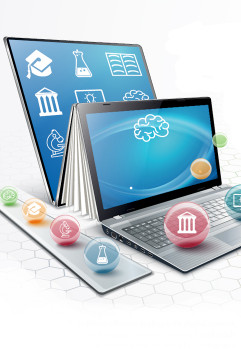Digital Knowledge Hub:A Platform for Content and a Window to the Future
Digital content in all its forms is the basic locomotive of all the applications of the Fourth Industrial Revolution, and includes the data collected so that it becomes organized information that refers the beneficiary to accurate content that meets his/ her knowledge needs.
To facilitate effective dealing with digital content, it must be developed, stored, processed and made available for research and retrieval by relying on a standard platform that possesses the ingredients that enable the beneficiary to access, discover and obtain content.
To achieve these goals, the Digital Knowledge Hub at the Mohammed Bin Rashid Al Maktoum Knowledge Foundation (MBRF), which is a container platform for the largest Arabic digital content, was developed as a solution to build and develop knowledge centers and to be a tool for preserving digital memory for Arab institutions. Thus, the platform will be the first Arab tool to achieve two main objectives:
First: Contributing to bridging the Arab digital divide, with its digital content that reaches more than 300,000 titles that include more than 3.5 million digital items.
Second: D eveloping t he fi rst A rab p latform t o bridge the gap of Arab digital solutions and rely on systems that are developed locally, which is an important shift in the view of Arab institutions to deal with knowledge products from just the state of consumption to production of the products.
The Digital Knowledge Hub as a platform is distinguished by a set of features that make it outperform its peers of globally competitive platforms:
1. Open Platform:
Institutions can use the Hub to build their institutional repositories and preserve their digital memory with comprehensive mechanisms compatible with international standards. There is no doubt that institutions need to possess an open platform that achieves full flexibility in dealing with the content they have produced. The platform should also maintain their knowledge outputs in a unified repository which is also standardized, flexible and comprehensive..
2. Qualitative Libraries:
The Hub is characterized by the diversity of mechanisms for handling content, as it works as a general and specialized platform that can be configured to build quality libraries and thematic packages specialized in specific fields based on the needs of institutions. The Digital Knowledge Hub has already been employed in building more than 10 specific libraries in various fields at the MBRF, as well as dividing the content into specialized, objective and specific packages based on the needs of the institutions.
3. Syncing Reading :
The Digital Knowledge Hub is a platform that allows one to identify the materials that are read through the live broadcasts on the platform, which is a digital guide for readers, and an essential tool for evidence-based selection of materials that readers recommend to other people working with them in the same knowledge field.
4. Mining Data:
The Hub provides the possibilities of building data retrieval through the use of data mining methods for digital materials, whether related to topics, titles or forms of materials, in addition to retrieving data with search words that enable researchers to identify the topics the beneficiaries search for and the words used in the searches.
5. Directions:
The Hub provides possibilities for discovering the trends of the beneficiaries through conducting analyzes and measurements of the uses by the beneficiaries and visitors, identifying the materials preferred by them and recommending them to other readers in the same fields of knowledge and trends. The platform seeks in the future to support these trends with smarter analyzes that enable beneficiaries and visitors to discover materials that meet their needs and to display those materials on the beneficiaries’ pages and recommend them as supporting digital materials.
6. Tools of Control:
The Hub is a platform that features a comprehensive control tool that enables institutions to effectively deal with all operations that take place on it starting from data entry, processing, analysis, and the structure and identity of the website, and obtaining statistics and reports through to managing powers and forms for accessing data and content.
There is no doubt that the success of the MBRF in building this Digital Knowledge Hub and making it available to the Arab information and knowledge society is an effective contribution to bridging the gap of Arab digital content. This platform is also a comprehensive tool and an integrated package of leading digital solutions in the Arab environment that contribute to the transition from a knowledgeconsuming society to a knowledge-producing society.
The intense and efficient use by Arab institutions of this product and knowledge content is a locomotive for the transition towards a knowledge economy, as the platform can be used to build alliances for digital libraries and to preserve digital rights for institutions that purchase digital content, and mechanisms for maintaining, storing and making it available. And most important of all is building an Arab human capital system that possesses knowledge of the mechanisms of developing integrated digital systems and how to use them to serve Arab institutions.
The Digital Knowledge Hub is a container platform for the
largest Arabic digital content and also a solution for building
and developing knowledge centers and a tool for preserving
digital memory for Arab institutions.








